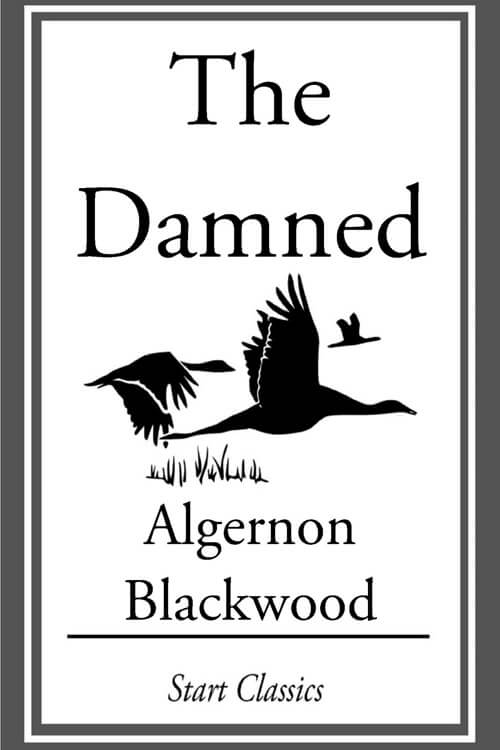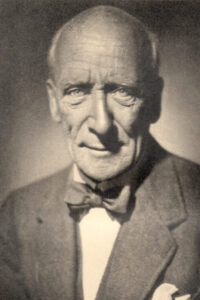
The Damned
“It’s a longish visit, a month—isn’t it?” I hedged, smiling at the details that seduced me and ashamed of my man’s selfishness, yet knowing that Frances expected it. “There are points about it, I admit. If you’re set on my going with you, I could manage it all right.”
I spoke at length in this way because my sister did not answer. I saw her tired eyes gazing into the dreariness of Oakley Street and felt a pang strike through me. After a pause, in which she repeated no word, I added: “So, when you write the letter, you might hint, perhaps, that I usually work all the morning and—er—am not a very lively visitor! Then she’ll understand, you see.” And I half-rose to return to my diminutive study, where I was slaving, just then, at an absorbing article on Comparative Aesthetic Values in the Blind and Deaf.
But Frances did not move. She kept her grey eyes upon Oakley Street, where the evening mist from the river drew mournful perspectives into view. It was late October. We heard the omnibuses thundering across the bridge. The monotony of that broad, characterless street seemed more than usually depressing. Even in June, the sunshine was dead, but with autumn, its melancholy soaked into every house between King’s Road and the Embankment. It washed thought into the past instead of inviting it hopefully towards the future. For me, its easy width was an avenue through which nameless slums across the river sent creeping messages of depression, and I always regarded it as Winter’s main entrance into London—fog, slush, and gloom trooped down it every November, waving their forbidding banners till March came to rout them.
Its one claim upon my love was that the south wind sometimes swept unobstructed up it, soft with suggestions of the sea. These lugubrious thoughts I naturally kept to myself, though I never ceased to regret the little flat whose cheapness had seduced us. Now, as I watched my sister’s impassive face, I realized that perhaps she, too, felt as I felt, yet was a brave woman without betraying it.
“And, look here, Fanny,” I said, putting a hand upon her shoulder as I crossed the room, “it would be the very thing for you. You’re worn out with catering and housekeeping. Mabel is your oldest friend besides, and you’ve hardly seen her since he died—”.
Read or download Book
Algernon Blackwood
Algernon Henry Blackwood, CBE (14 March 1869 – 10 December 1951) was an English broadcasting narrator, journalist, novelist, and short story writer and among the most prolific ghost story writers in the genre’s history. The literary critic S. T. Joshi stated, “His work is more consistently meritorious than any weird writer’s except Dunsany’s” and that his short story collection Incredible Adventures (1914) “may be the premier weird collection of this or any other century”.
Life and work
Blackwood was born in Shooter’s Hill (now part of southeast London, then part of northwest Kent). Between 1871 and 1880, he lived at Crayford Manor House, Crayford, and was educated at Wellington College. His father, Sir Stevenson Arthur Blackwood, was a Post Office administrator; his mother, Harriet Dobbs, was the widow of the 6th Duke of Manchester. Peter Penzoldt said his father, “though not devoid of genuine good-heartedness, had appallingly narrow religious ideas.” After Algernon read the work of a Hindu sage left behind at his parent’s house, he developed an interest in Buddhism and other Eastern philosophies. Blackwood had a varied career, working as a dairy farmer in Canada, operating a hotel for six months, as a newspaper reporter in New York City, bartender, model, journalist for The New York Times, private secretary, businessman, and violin teacher. During his time in Canada, he also became one of the founding members of the Toronto Theosophical Society in February 1891.
Throughout his adult life, he was an occasional essayist for periodicals. In his late thirties, he moved back to England and started writing supernatural stories. He successfully wrote at least ten original collections of short stories and later told them on radio and television. He also wrote 14 novels, several children’s books, and several plays, most of which were produced but not published. He was an avid lover of nature and the outdoors, as many of his stories reflect. To satisfy his interest in the supernatural, he joined The Ghost Club. He never married; his friends said he was a loner and cheerful company.
Jack Sullivan stated that “Blackwood’s life parallels his work more neatly than perhaps that of any other ghost story writer. Like his lonely but fundamentally optimistic protagonists, he was a combination of mystic and outdoorsman; when he wasn’t steeping himself in occultism, including Rosicrucianism or Buddhism, he was likely to be skiing or mountain climbing.” Blackwood was a member of one of the factions of the Hermetic Order of the Golden Dawn, as was his contemporary Arthur Machen. Cabalistic themes influenced his novel The Human Chord.
His two best-known stories are probably “The Willows” and “The Wendigo”. He would also often write stories for newspapers at short notice, with the result that he was unsure exactly how many short stories he had written, and there was no sure total. Though Blackwood wrote many horror stories, his most typical work seeks less to frighten than to induce a sense of awe. Good examples are the novels The Centaur, which reaches a climax with a traveller’s sight of a herd of mythical creatures, and Julius LeVallon and its sequel The Bright Messenger, which deal with reincarnation and the possibility of a new, mystical evolution of human consciousness. Blackwood wrote in correspondence with Peter Penzoldt.






